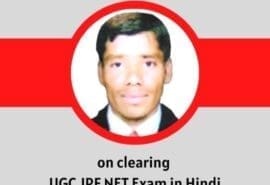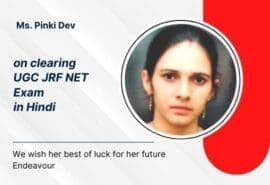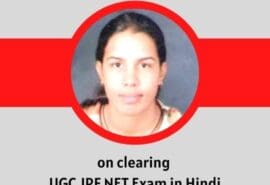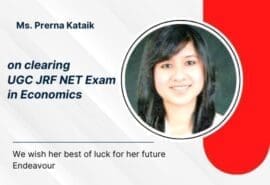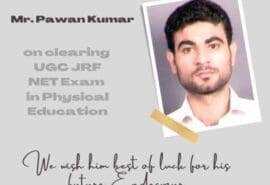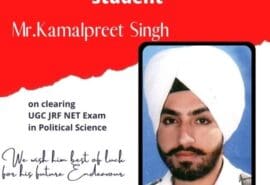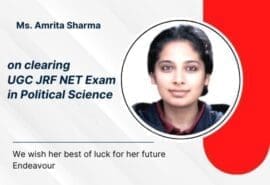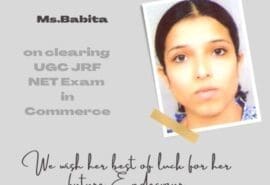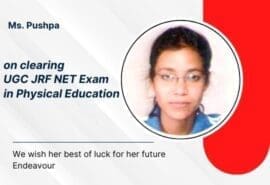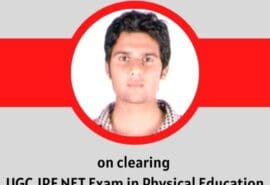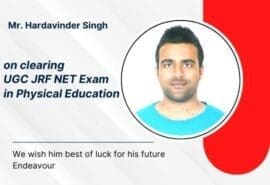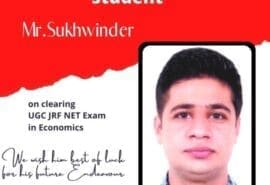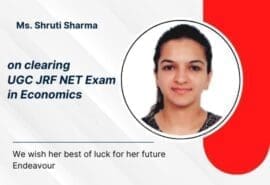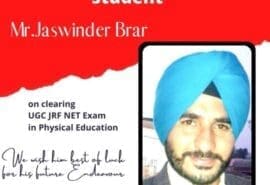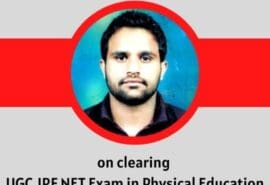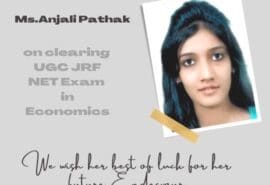
NTA UGC JRF NET Geography Coaching
NTA UGC JRF NET Geography Coaching
The National Eligibility Test (NET), also known as UGC NET or NTA-UGC-NET, is conducted by the National Testing Agency (NTA) on behalf of the University Grants Commission (UGC) to determine eligibility for the post of Assistant Professor and Junior Research Fellowship (JRF) in Indian universities and colleges.
The NTA UGC NET exam for Geography tests the candidate's comprehension of the subject, teaching skills, and research aptitude.
In this comprehensive guide, we will discuss the exam pattern, syllabus, best books for preparation, previous year papers, exam strategy, and tips to crack NTA UGC NET Geography. Read on to learn how to prepare for this exam effectively.
For CSIR NET Life Science Exam Preparation Coaching, contact us at Mantram Study Group, SCO No. 80-81, First Floor, Sector 15-D, Chandigarh (Near Gate No. 2, Panjab University Chandigarh – Contact – 9779797575/ 9463049859)
NTA UGC NET Geography - Overview
Before looking at the detailed preparation strategy, let's first understand the NTA UGC NET Geography exam:
- It is a national-level entrance exam conducted twice a year to determine eligibility for Assistant Professor and JRF positions in Geography subject
- There are two papers - Paper I and II with a total of 200 marks
- Paper I tests teaching and reasoning ability with 50 MCQ questions for 100 marks
- Paper II tests subject-specific knowledge with 100 MCQ questions for 200 marks
- A negative marking of 33% is applicable for each wrong answer
The exam tests the candidate's teaching aptitude, research skills, and comprehensive understanding of the subject matter in Geography. Thorough preparation is, therefore, essential to crack this highly competitive exam.
NTA UGC NET Geography Syllabus
As per the latest exam pattern, the NTA UGC NET Geography syllabus consists of the following major areas:
Paper I Syllabus:
- Teaching Aptitude
- Research Aptitude
- Comprehension
- Communication
- Mathematical Reasoning
- Logical Reasoning
Paper II Syllabus:
- Geomorphology
- Climatology
- Oceanography
- Cartography
- Geopolitics
- Population Geography
- Settlement Geography
- Economic Geography
- Social Cultural Geography
- Regional Planning
- Models and Theories in Geography
- Geospatial Technologies
- Application of Statistics in Geography
- Geography of India
Best Books for NTA UGC NET Geography
The following are some of the recommended books to refer to for NTA NET Geography to cover the entire syllabus:
- A Contemporary Look at Geography by Savindra Singh
- Fundamentals of Physical Geography by G.C. Leong
- Principles of Geography by Munir AZ Mir
- Comprehensive Geography For UPSC Civil Services and other competitive exams by Khullar
- Certificate Physical and Human Geography by Goh Cheng Leong
- Geography of Population by RS Mishra
- Economic and Social Geography Made Simple by Piyush Kumar Sinha
You can also refer to UGC NET's previous year's papers and sample papers to understand the type of questions asked.
NTA UGC NET Geography Preparation Strategy
Here are some key strategies for effective preparation for the NTA UGC NET exam:
Thoroughly Analyze Syllabus and Exam Pattern: Begin your preparation by carefully reviewing the syllabus, section-wise topics, weightage, and exam pattern. This will give you clarity on how to distribute time and effort.
Prepare Study Notes from Recommended Books:
- Read through the suggested books for in-depth understanding.
- Prepare handwritten notes to retain information better.
- Categorize notes chapter-wise and topic-wise.
Solve Previous Year Question Papers: Solving 10-year PYQs will acquaint you with the frequently asked topics, difficulty level, types of questions, etc. Analyze your weak areas to improve.
Refine Test-Taking Skills with Mock Tests: Regularly appearing for full-length mock tests under exam-like conditions is important for self-evaluation and building exam temperament. Identify improvement areas.
Stress on your Strong Topics/Areas: Allot more time on the geography topics you are stronger in as they can help you gain maximum marks. At the same time, pay attention to weaker topics.
Practice OMR Sheets: Since the MCQ-based exam, get accustomed to using OMR sheets while attempting mock tests at home. This will help you avoid negative markings for wrong bubbling on the final day.
Stay Motivated, Build Focus, & Beat Stress: Practice yoga and meditation to enhance concentration, reduce anxiety, and boost confidence to apply your exam preparation more effectively.
Key Tips for NTA UGC NET Geography
Lastly, here are some success mantras to ace the NTA UGC NET Geography exam:
✔ Study every subject topic comprehensively
✔ Select questions accurately in the exam to avoid negative marking
✔ Keep calm and avoid guesswork for unsure questions
✔ Check all objective-type questions thoroughly before the final selection
✔ Fill the OMR sheet cautiously to minimize errors
✔ Attempt mock tests in simulated exam conditions at home
✔ Take breaks to refresh your mind while studying
With meticulous preparation as per the points outlined above, they are cracking the intense competition in NTA UGC NET Geography to become eligible for Assistant Professor roles, and JRF can become a reality. Stay positive and focus on your dream!
FAQ
Who is eligible for UGC NET geography?
Educational Qualification
Candidates must compulsorily hold a Master's degree in Geography or applied branches like Geo-informatics, Environmental Geography, Geospatial Science, etc., from a recognized Indian university/institute.
General and OBC category applicants should have a minimum of 55% aggregate marks in their post-graduation, while relaxation of 5% is allowed for reserved SC/ST/PwD categories.
Only qualifications acquired through the regular classroom program are valid. Distance learning degrees do not meet UGC NET eligibility criteria. Final semester Master's students can also apply subject to meeting minimum percentage requirements on qualifying.
Age Limit
The upper age limit for candidates seeking Assistant Professor through UGC NET Geography is 55 years, with relaxations for reserved groups.
But Junior Research Fellowship aspirants should be under 30 years on the exam date with a 5-year exemption applicable for SC/ST/OBC(NCL)/PwD/female applicants, making the highest age 35 years for them.
Attempt Limit
Earlier, candidates were allowed only 6 attempts for Assistant Professor and 3 for JRF in the UGC NET Geography exam. However, as per the latest NTA exam pattern, all attempt restrictions have been removed, enabling candidates to take the test any number of times until the age limit criteria are met.
Physical Fitness Norms
No physical health parameters or fitness certificates are required in the eligibility criteria for the NTA UGC NET test. Candidates who are medically fit and in a sound state of mind, meeting all other norms regarding educational qualification and age limit, can appear for the exam.
Relaxation Permissible
The 5% concession permissible in the minimum required Master's degree percentage for reserved categories covers SC, ST, OBC (non-creamy layer), transgender, and PwD applicants. OBC community should have a valid non-creamy layer certificate issued in the last 1 year from the competent authority.
Qualifying Criteria
It is mandatory to individually pass Paper I and Paper II, scoring minimum cutoff marks. Only candidates aggregating 40% marks across both papers become eligible for JRF and Assistant Professor subject to fulfillment of category-specific requirements.
JRFs are eligible to apply for Assistant Professors roles, but the reverse is not applicable. Clearing UGC NET is compulsory to become a Professor at Indian universities as per the latest regulations.
Documents Required
While filling out the online application, you must upload soft copies of colored passport-sized photos, signatures, caste certificates (if applicable), PwD certificates (if applicable), and valid photo ID proof like Aadhar cards and Master's degree mark sheets for scrutiny.
Distance Learning Ineligibility
Pursuing post-graduation in Geography through distance learning, correspondence courses, or online mediums disqualifies an applicant from taking NTA UGC NET per the latest UGC directives. Only regular full-time classroom programs with practical/fieldwork components are considered.
Thus, by meeting the eligibility norms regarding age, educational degree, percentage obtained, physical health, and others highlighted above, you can apply and take the NTA UGC NET Geography exam, which is periodically conducted twice every year in June and December.
What is the syllabus for UGC NET geography?
Paper Structure
The geography syllabus for NET is divided into two papers - Papers I and II. Paper I tests teaching & general aptitude, comprising 2 sections. Paper II evaluates the core understanding of Geography with 2 sections of 50 marks each on human and physical aspects.
Paper I Syllabus
This paper is common for candidates from all subjects. It assesses logical and mathematical reasoning ability, reading comprehension, divergent thinking, and general awareness required for teaching.
Sections:
- Teaching Aptitude
- Research Aptitude
Key Areas Tested:
- Communication & reasoning skills
- Mathematical & statistical concepts
- Assessment approaches
- Educational issues
- Research ethics & methods
- General mental ability
Paper II Syllabus
This tests candidates' grasp of the subject matter, theories, tools, and techniques related to the discipline of geography.
Sections:
- Section A: Physical Geography
- Section B: Human Geography
Detailed Syllabus:
- Geomorphology - Landforms, Endogenetic & Exogenetic forces
- Climatology - Composition of atmosphere, Climate classification
- Hydrology - Distribution and properties of water
- Soils - Soil formation, classification, properties
- Oceanography - Ocean geography & submarine relief features
- Cartography - Mapping principles & types of thematic maps
- Geopolitics – Heartland and Rimland theories, Electoral Geography
- Population Geography - Theories, patterns & regional disparities
- Settlement Geography – Types, hierarchy, land use classification
- Economic Geography – Location theories, resources classification
- Regional Planning - Regionalization concepts & planning regions
- Geospatial Technology - RS, GIS, GNSS applications
- Statistical Application - Measures of central tendency, Regression models
- Geography of India - Physical & human attributes
Candidates can perform well in the exam by studying the syllabus comprising teaching aptitude and core geography subject domains mentioned above. Rigorous preparation of each major area will stand aspirants in good stead to qualify for lectureship.
How do you crack net geography?
The National Eligibility Test (NET) is a national-level eligibility test for lectureship and Junior Research Fellowship (JRF) posts in Indian universities/colleges.
NET Geography poses profound questions to test aspirants on their subject's knowledge depth, analytical skills, and mastery of fundamental geography theories. Here are useful strategies for cracking it.
Develop Conceptual Clarity
Understand the fundamentals of Core Geography topics clearly before building advanced knowledge. Revise basic definitions, classifications, and principles accurately by referring to specialized books, atlas, and online resources. Creating your handwritten study notes helps in memorizing concepts better.
A study from Multiple Sources
More than just relying on a single book is required. Refer to several concise theory guides, accelerated learning course material, MOOCs, question banks, and online forums to build a strong grasp of the key geographical components emphasized in the syllabus.
Terminologies differ across authors, so evaluating multiple references develops richer insight.
Practice Previous Exam Papers Extensively
Solving previous years' question papers acquaints you with recurring themes, answers writing styles, common trends, and difficulty levels, and enables self-evaluation. Analyze both correct and incorrect responses.
Improve speed by regular timed mock tests simulating real exam pressure. Subscribe to online test series that provide in-depth performance analytics on your geography preparation progress.
Boost Retention using Mnemonics
The expansive Geography syllabus demands excellent retention capacity. Mnemonic devices like FORMULAS for climatology factors, PEMDAS for population theories, and APPLE-BANANA for map projections help relate topics to easy-to-remember codes, aiding faster recall—inter-link tricky concepts using such memory-enhancing techniques regularly.
Focus on Map-Based Questions
Map-based questions testing identifying terrain features, the spatial distribution of phenomena, characteristic representations using contours, heat maps, etc, comprise a significant chunk.
Thoroughly practice interpreting, analyzing, and inferring concepts from varied map diagrams on physical landforms, population densities, economic activities, transportation links, voting patterns, etc.
Develop Multi-Disciplinary Orientation
Modern Geography and its associated branches like Geo-informatics have interfaces with diverse STEM disciplines, including Mathematics, Statistics, Computer Science, Environmental Science, etc.
Questions can test interdisciplinary applications. Broaden your horizons by exploring such multi-domain examples in competitive exam preparatory material and online lecture videos.
Attempt Mock Tests in Simulated Settings
Write full-length practice exams replicating the actual 3-hour NET schedule regularly under strict timed conditions without any external aid as per exam rules.
This will improve concentration and time management, reduce careless errors, and build test-taking temperament to alleviate exam hall anxiety. Analyze the mock test scorecards to overcome weak areas.
To conclude, employ the above holistic preparation techniques spanning theory fundamentals, previous exam awareness, retention tools, map visualization, relevance of contemporary topics, and mock test performance tracking to crack the intensely competitive NET Geography exam effectively. Stay strategic, and success will follow!
What is the difficulty level of UGC NET geography?
UGC NET Geography is a moderately difficult exam that tests aspirants on diverse theoretical concepts and analytical ability to assess eligibility for Assistant Professor roles and Junior Research Fellowships. Let us analyze key statistical highlights that determine its overall difficulty quotient.
Success Ratio
Per the latest NTA scorecards, the overall qualifying percentage in UGC NET Geography paper hovers between 3% to 5% even after combining candidates who clear just Paper I or II and those who earn both.
This indicates the extremely challenging nature of the exam, with low chances of cracking it in one attempt.
Compare Marks vs Qualified Ratio
Out of roughly 2500 candidates appearing in Paper II annually, barely 100-150 clear the exam, highlighting the intense competition.
It would help if you scored extremely high marks, beating the cutthroat merit factor to stand any reasonable chance of a lecturership. Benchmark your preparedness against past toppers.
Negative Marking Impact
The negative marking provision for every wrong answer further escalates the difficulty scale as it demands higher accuracy.
Random guesswork without sound conceptual clarity will pull down scores drastically rather than help. Select questions cautiously and attempt only topics of your strength.
Rank Prediction Range
Considering the low qualifying ratio, you must envision securing among the top 100 All India Ranks at the minimum to qualify for the Assistant Professor or JRF cutoff scores, which hover above 60% marks. Set your performance targets ambitiously.
Compare Selection Criteria
The minimum aggregate qualifying marks are also pegged at 40%, which seems relatively low, but only exceptional scorers cross the high benchmark due to intensely fierce competition. Quality of content takes precedence over just the quantity of concepts mugged up while writing.
Compare Multi-disciplinary Questions
Questions can assess inter-disciplinary applications testing wider analytical skills beyond just geographical theories. The ability to correlate multi-domain concepts with socio-economics, governance, and environmental sciences increases the difficulty quotient.
Map & Diagram Analysis Skills
Strong visualization abilities for accurately interpreting satellite imagery, topological contours, heat concentration spot maps, land use distribution pie charts, etc., play a crucial role. Practice speed-based questions repeatedly.
Evaluate Previous Years' Paper Difficulty
Over the years, topics like cartography, statistical tools, and geospatial technology applications have reported relatively lower scores, signifying higher failure rates due to complex question perception. Similarly, map-based questions need to be more correctly attempted or skipped by many applicants.
What is the pattern of the UGC NET geography exam?
Exam Mode and Duration
UGC NET Geography test is conducted in CBT (Computer Based Test) format at designated exam centers across India. The total duration is 3 hours without any scheduled breaks in between.
Number of Papers
The structure comprises 2 papers - Paper I and Paper II conducted in a single session. Candidates must attempt both papers sequentially on the same day in their 3-hour exam slot.
Paper I Pattern
- Duration: 1 hour
- Questions: 50 MCQs
- Marks: 100
- Areas tested: Teaching aptitude, reasoning ability, comprehension, general awareness
- Negative Marking: YES (0.33 marks deducted per wrong attempt)
This is a common general test paper for candidates with no specific syllabus for all subjects. The level is set from medium to difficult, covering many topics.
Paper II Pattern
- Duration: 2 hours
- Questions: 100 MCQs
- Marks: 200
- Areas tested: Geography subject specialization
- Negative Marking: YES (0.66 marks deducted per wrong attempt)
The focus is comprehensive testing of core Geography topics across physical and human environment themes. Candidates can attempt any 50 questions from Sections A and B, aggregating their best 100 responses for final evaluation.
Marking Scheme
- Each question carries 2 marks
- 66 marks are deducted per incorrect response
- There are no deductions for unattempted questions
Qualifying Criteria
To be eligible for JRF/Assistant Professor roles, you must secure:
- Minimum 40% aggregate marks combining Paper 1 and Paper II
- Additionally, score minimum qualifying cutoff marks in each paper separately
The NTA notifies cutoffs for General and reserved categories on scorecards. Candidates have to fulfill all conditions diligently.
Result Declaration
NTA publishes answer keys on the exam portal, inviting challenges if any discrepancy is noted. Finalized answer keys and recorded responses are leveraged to compute scores on a scale 100. Results are declared within 60 days post-exam completion.
By understanding the latest UGC NET test format and structural composition introduced recently, Geography aspirants can strategize a targeted preparation plan accordingly, covering all critical focus areas for maximizing their success potential.
Is there a negative marking in UGC NET geography?
The National Eligibility Test (NET) conducted by the National Testing Agency (NTA) on behalf of the University Grants Commission (UGC) is one of the toughest screening tests for recruitment to Assistant Professor roles.
For some subjects, including Geography, the exam adopting negative marking for incorrect answers further escalates difficulty.
What is Negative Marking?
Negative marking implies penalty deductions from the total marks scored for wrong answers marked by a candidate in multiple-choice questions-based exams. There is NO NEGATIVE marking for questions that should be completed or completed.
Why Negative Marking in UGC NET?
Discourage random guesswork - To force aspirants to attempt only those options they are sure about rather than making blind guesses to score marks by chance. This filters out only serious applicants.
Enhances credibility - Higher accountability towards checking genuine subject knowledge vs pure guess luck. Improves exam neutrality and quality of selected candidates.
Is There a Sectional Time Limit?
No, NO specified time is allocated per section in Paper I and II. Candidates can distribute the total time per their comfort across sections. However, attempting questions randomly without focusing on strengths may increase negative marking risk.
What is the Negative Marking Pattern?
In Paper I:
- 33 marks are deducted for every wrong MCQ response
- No negative marking for questions not attempted
In Paper II:
- 66 marks are deducted per incorrect answer choice
- Unattempted questions are not penalized
What is the Ideal Attempting Strategy?
- Carefully analyze each question before selecting an option
- Tick the most appropriate choice only if you are confident
- In case of confusion or doubt, skip the question instead of guessing
- Focus on your areas of strength through good time management
What is the Score Impact?
As 2 marks are allotted per question in Paper II, 0.66 deduction per wrong attempt translates to a 33% negative marking percentage, which can drastically pull down scores if too many options are randomly guessed incorrectly.
Does Negative Marking Make Clearing Cutoff Difficult?
Yes, cutoff percentages are typically lowered to counter the stricter marking provisions. However, the possibility of totaling high marks still reduces if too many negative markings are incurred for easier questions.
In summary, the negative marking aims to enhance serious scholarship assessment objectives for the UGC NET Geography exam. Avoid casual exam temperament and attempt questions in focused areas, confidently minimizing penalties.
How many papers are there in UGC NET geography?
There are two papers that candidates have to take in the NET exam for the subject of geography.
Paper I Details
Paper Pattern
- Objective-type multiple-choice questions
- Total questions: 50
- Marks: 100
- Duration: 1 hour
Syllabus
- No specific subject syllabus
- Tests teaching aptitude and reasoning ability
Key Areas Tested
- Teaching and Research Methodology
- Comprehension, Communication, ICT
- Data Interpretation, Analysis
- Intellect of Current Affairs
- Logical and Mathematical Reasoning
The difficulty level ranges from moderate to difficult and tests a candidate's general scholarship. This paper is common for all subjects in the NET exam and has to be taken mandatorily.
Paper II Details
Paper Pattern
- Objective MCQ type
- Total questions: 100
- Marks: 200
- Duration: 2 hours
Syllabus
- Tests core understanding of the Geography discipline
- Categorized into Physical and Human Geography themes
Section wise composition:
- Section A: Physical Geography - 50 questions
- Section B: Human Geography - 50 questions
Candidates can attempt any 50 questions from each section, bringing the best 100 responses for the final score.
Key Areas Covered
- Geomorphology, Climatology, Hydrology, Oceanography
- Economic Geography, Population theories, Settlement models
- Environmental concerns, Sustainable Development, Geospatial tools
The difficulty level is moderately challenging, with a blend of direct and applied questions demanding analytical reasoning.
Thus, the NTA UGC NET for Geography comprises two compulsory papers - Paper I for the general test and Paper II emphasizing subject specialization. Performance in both papers determines eligibility for Lectureship and JRF.
Thanks for visiting our website Mantram Study Group
You may also join Mantram for NORCET Coaching
CHECK OUR OTHER LINKS: -



